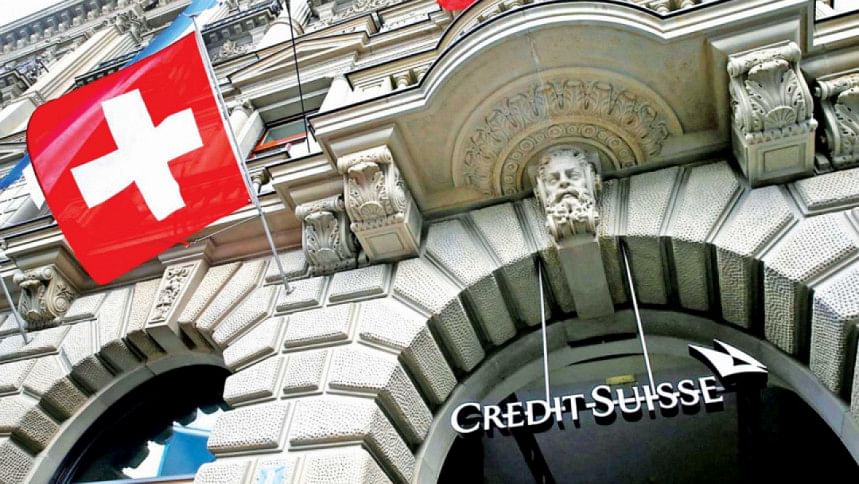Deposits of Bangladeshi banks, nationals with Swiss banks drop by 93.7%

Funds deposited by Bangladeshi citizens and banks with Swiss banks dropped 93.7 percent to 55.3 million Swiss francs (CHF) last year on the back of the pressure on the country's foreign currency reserves.
In 2021, Bangladeshi banks and citizens together had CHF 871.1 million with the Swiss banking system.
Of the CHF 55.3 million, CHF 35.6 million -- which comes to about Tk 429.5 crore -- belongs to Bangladeshi nationals, which is the highest since 2016, according to data released by the Swiss National Bank yesterday. The amount is an increase of 35.3 percent year-on-year.
The data does not specify who the amounts belong to and whether the funds were laundered from Bangladesh. A portion of the deposits may be legitimately earned income outside of Bangladesh.
At the end of 2022, Bangladeshi banks had just CHF 19.6 million, down from CHF 844.8 million, as the dollar shortage at home prompted them to use up their balance with Swiss banks to settle foreign transactions.
In 2022, Bangladesh's foreign currency reserves shrunk by about 26 percent to $33.7 billion, according to central bank statistics. This prompted the authorities to ration the supply of dollars.
Ahsan H Mansur, executive director of the Policy Research Institute of Bangladesh, dismissed the increase in Bangladeshi customer deposits with Swiss banks to the highest level since 2016, when it stood at CHF 47.6 million.
"It is a small amount -- Swiss banks have lost their allure to Bangladeshis," he said, adding that the amount is not even a patch on the volume of wealth that is flying out of Bangladesh.
The lion's share of the reported customer deposits is likely to have taken place through illegal means like trade-based money laundering through mis-invoicing, hundi, etc. as there is no legal means through which anything more the $12,000 annually can be taken out of the country, said Iftekharuzzaman, executive director of Transparency International Bangladesh.
One reason for such a high increase may be partially related to perceived political uncertainty centring on the national polls due to take place in January next year and the ongoing economic crisis driving a bigger appetite for deposits in foreign currency, he said.
"But more importantly, the lack of examples that money laundering is detected and such stolen money and assets are repatriated is the main reason. Any crime that remains uncontrolled is bound to increase unabated."
There are national and international legal instruments to successfully prevent and repatriate laundered money, and the roadmap for this is not unknown to relevant institutions that are mandated to do so, Iftekharuzzaman added.
In a discussion organised by the Diplomatic Correspondents Association Bangladesh on August 10 last year, Nathalie Chuard, the ambassador of Switzerland to Bangladesh then, said the Bangladesh government never sought information on its citizens' money parked in Swiss banks.
"The Swiss government does not want any corruption or laundered money to be deposited in Swiss banks. Governments of the two countries can discuss the issues raised regarding Bangladeshis keeping money in Swiss banks," she said.
This prompted the High Court to order the government to explain why it had not done so.
In response, Foreign Minister AK Abdul Momen said Chuard's statement was not true, going so far as to claim non-cooperation of the Swiss authorities to the BB's request for information.
The Bangladesh Financial Intelligence Unit, the central bank wing responsible for investigating money laundering, suspicious transactions and cash transaction reports, said it sought information on 67 persons and organisations who have allegedly deposited money to banks in Switzerland.
But the Switzerland Financial Intelligence Unit conveyed that they have information on just one.
Not only Bangladesh, deposits from India and Pakistan with Swiss banks also dropped in 2022.
Deposits from India dropped 11.2 percent year-on-year to CHF 3.4 billion in 2021. From Pakistan, deposits shrunk 44.9 percent to CHF 388.7 million.
However, deposits from the crisis-hit Sri Lanka increased 18.8 percent to CHF 66.5 million last year.
Deposits from Nepal soared 61.9 percent year-on-year to CHF 482.5 million.
Switzerland has long been a preferred destination for the wealthy from all over the world to park their funds for tax evasion purposes, thanks to the high level of confidentiality protections the country's banking law allows.

 For all latest news, follow The Daily Star's Google News channel.
For all latest news, follow The Daily Star's Google News channel. 



Comments